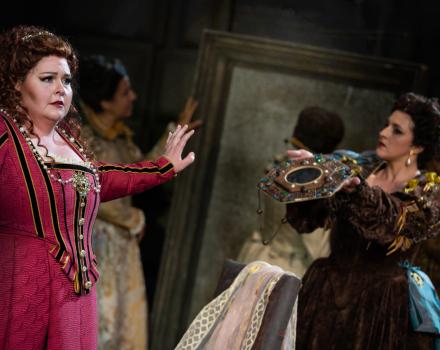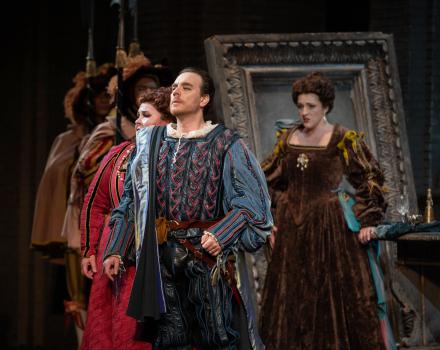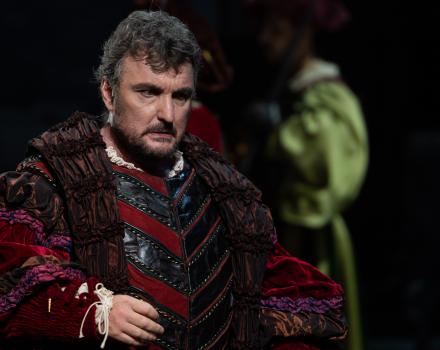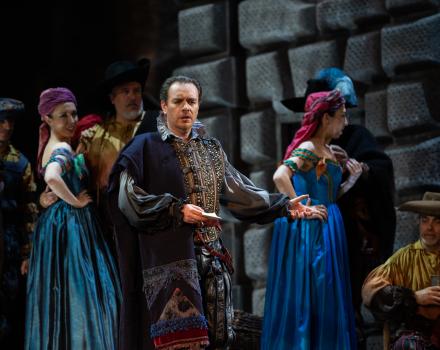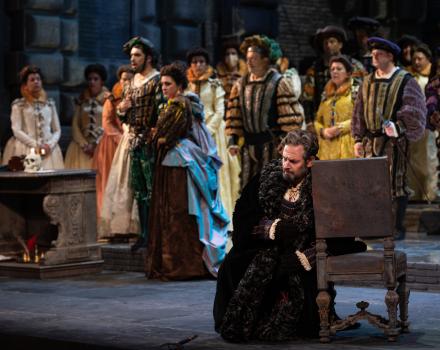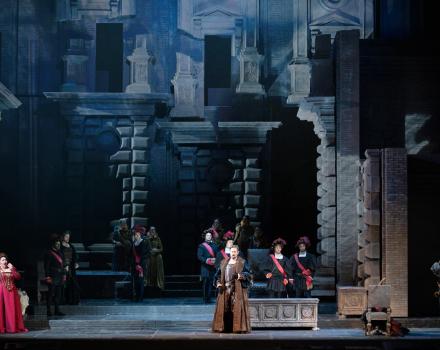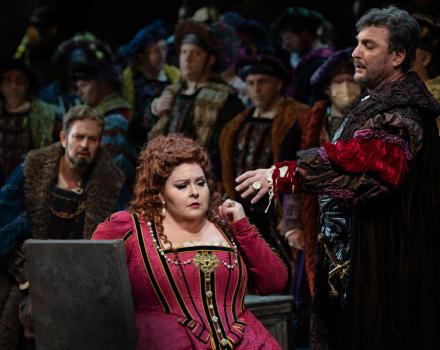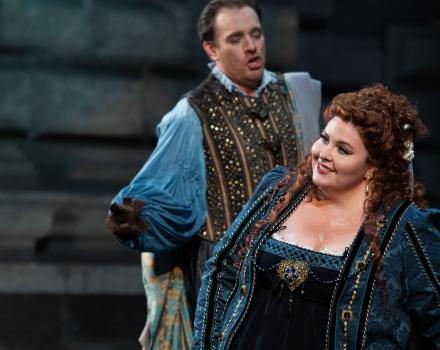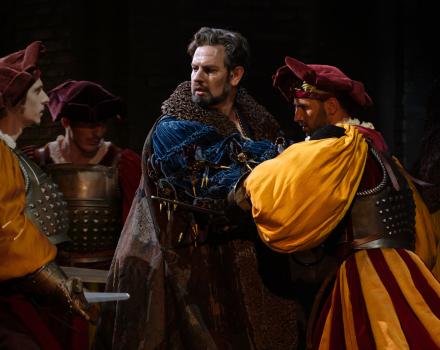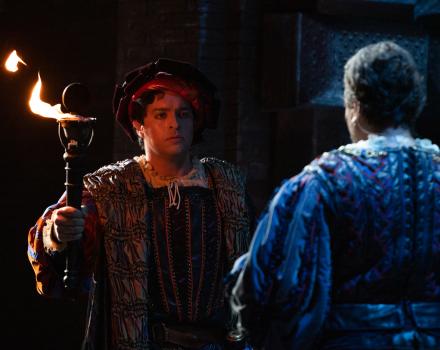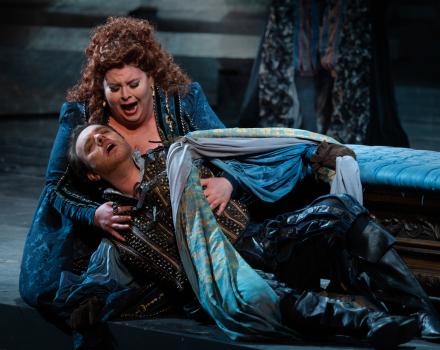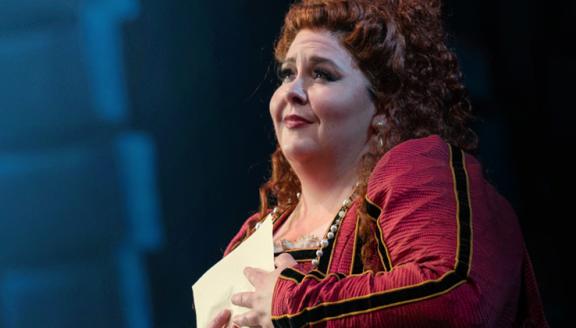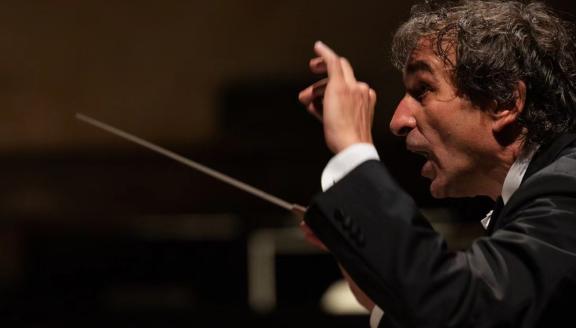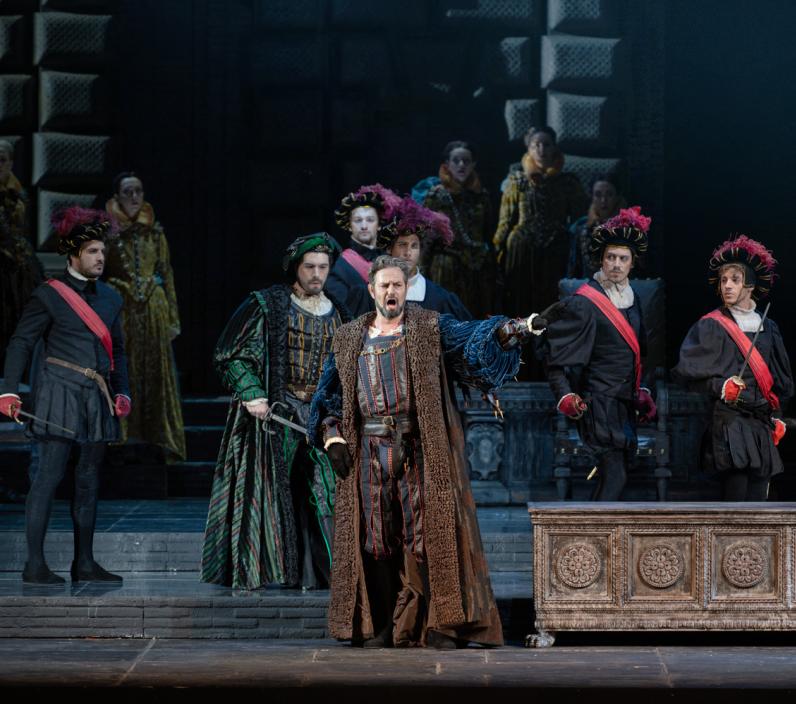
Ernani is a love story about a young woman, Elvira, caught between three men: her lover, the nobleman-turned-outlaw Ernani; her guardian, the rich, elderly de Silva, who wants her for himself; and Don Carlo, the King of Spain who also has his eye on Elvira. Given the number of protagonists, it is also the story of a tragedy.
Only 14 years after the premiere of Hernani, Giuseppe Verdi adapted Victor Hugo’s play into an opera to premiere at La Fenice, Venice in 1844. Ernani was an immediate and lasting triumph for the young Verdi, marking his prowess at adapting an historical event (the crowning of Charles V as emperor at Aachen Cathedral) to a psychologically convincing musical drama. The backdrop of three men paying court to one woman was the perfect foil for Verdi to explore the expressive qualities of three types of male voice. The tenor, a youthful suffering lover - Ernani. The bass, an elderly ruthless egotist - de Silva. The baritone, a more complex figure torn between tenderness and violence, self-indulgence and idealism - Don Carlo. As luxuriant as the sumptuous costumes of Hugo de Anna’s period production, Teatro dell’Opera di Roma’s cast stars Angela Meade, Francesco Meli, Evgeny Stavinsky and Ludovic Tézier.
Cast
|
Ernani
|
Francesco Meli
|
|---|---|
|
Don Carlos
|
Ludovic Tézier
|
|
Don Ruy Gomez De Silva
|
Evgeny Stavinsky
|
|
Elvira
|
Angela Meade
|
|
Giovanna
|
Marianna Mappa
|
|
Don Riccardo
|
Rodrigo Ortiz
|
|
Iago
|
Alessandro Della Morte
|
|
Chorus
|
Teatro dell'Opera di Roma Chorus
|
|
Orchestra
|
Teatro dell'Opera di Roma Orchestra
|
| ... | |
|
Music
|
Giuseppe Verdi
|
|---|---|
|
Text
|
Francesco Maria Piave
Victor Hugo
|
|
Conductor
|
Marco Armiliato
|
|
Director
|
Hugo De Ana
|
|
Set and Costume Designer
|
Hugo De Ana
|
|
Chorus master
|
Roberto Gabbiani
|
|
Lighting
|
Vinicio Cheli
|
|
Lighting design revival
|
Valerio Alfieri
|
| ... | |
Videos
THE STORY
Act 1
The Bandit
In the mountains of Aragon.Ernani, the leader of a group of mountaineers and bandits in revolt against the King of Spain, tells his henchmen about his love for a young noblewoman, Elvira. She is in love with him too, but the following day is to be married, against her will, to an eiderly uncle, Don Ruy Gomez de Silva, Grandee of Spain. Ernani suggests that they elope together. In the castle of Don Gomez de Silva, on the eve of her wedding day, Elvira nervously awaits the arrival of Ernani with whom she is to elope, and receives the wedding gifts brought in by her handmaidens with some embarrassment. Suddenly, the King, Don Carlo, appears, secretly let in by Elvira’s governess. Don Carlo is also in love with Elvira, though he knows she is in love with Ernani; Elvira rejects him and when the King comes towards her, she grabs the dagger from his side and threatens to kill herself and him. Ernani now arrives through a secret door, flings himself on Don Carlo and accuses him of the violence suffered by his family at the hands of the ruling dynasty, culminating in the murder of his father, ordered by Carlo’s father. Elvira tries to prevent the clash between the two men, but to no avail. The mortal fight is interrupted, however, by Silva’s arrival. Silva thinks the two intruders are seducers and speaks of his dishonoured old age, and in the end vows his revenge. But as soon as the King reveals his identity, all his rage subsides, as he never suspects for a moment that the King could be his rival. On the contrary, he asks Silva to give him hospitality for the night. At the same time, Carlo saves Ernani by introducing him as one of his trusted henchmen and ordering him to leave. Elvira, in a whisper, urges her beloved to obey: she will wait for him and remain faithful.
Act 2
The Guest
Magnificent hall in the castle of Don Ruy Gomez de Silva. As Elvira is about to be forced into marriage with Silva, Ernani, disguised as a pilgrim, appears, fleeing from the King’s troops who have dispersed his band of rebels. Silva offers him hospitality. But when Elvira appears in a wedding gown and Silva points to her as the woman who is to be his bride within the hour, the pilgrim reveals his identity and, as a wedding present, offers his head, upon which a high price has been set. Elvira protests her fidelity to Ernani, showing him the dagger with which she had intended killing herself, after having been led to the altar. And Silva, though thirsty for revenge, does not betray his guest. When the King, who has followed him arrives, Silva hides Ernani in a secret nook behind a large portrait of himself on the wall. When the King orders Silva to hand over the fugitive, he replies that the Silvas have never betrayed their hospitality, and offers his own life in exchange. The King then leaves, and seizing Elvira, who has interceded, carries her off as a hostage. Alone now, Silva tells Ernani to come out of his hiding-place and to follow him to the field, where they will decide their fate in a duel. Ernani hesitates to fight a man so much older than himself, and when he learns that the King has carried off Elvira, he reveals to Silva that Don Carlo is a rival of them both, and pleads with him to join forces to get Elvira back. Silva is reluctant to believe him, so Ernani says he is prepared to submit to Silva’s revenge and, as token of this, gives him his hunting horn. Whenever Silva wants Ernani to die, all he has to do is blow that horn and Ernani will kill himself. So the two men join in the conspiracy against the King.
Act 3
The act of clemency
Underground vaults with the tomb of Charlemagne at Aix-la-Chapelle. Don Carlo has come to hide out in the underground vaults of the tomb of Charlemagne in order to take the conspirators by surprise who are to meet there to plot against his life on the eve of his election to the emperor’s throne. Don Carlo tells his groom, Riccardo, that if he is elected, the news is to be announced by three cannon shots. As he waits he thinks back over his youth as though it were an empty dream: the responsibilities of his new duties will set him free from all passion forever. Don Carlo enters the tomb of Charlemagne; the conspirators appear and draw lots to decide upon the name of the man who is to strike him down. Ernani’s name is drawn. Silva, eager to carry out the revenge in his place, offers, in exchange, to release Ernani from the mortal pact, but Ernani refuses to give up avenging the death of his father by his own hand. The conspirators break into a chorus of praise, but the cannon sounds; at the third shot, Carlo emerges from the tomb, appearing to the terrified conspirators’ eyes as the ghost of Charlemagne himself. The door to the underground vaults is opened and the Electors file in, followed by pages bearing the imperial insignia, and by a procession of lords and ladies, including Elvira. By now Carlo has become the emperor Charles V, and he orders the conspirators to be arrested, separating the nobles from the others: for the former, the axe, for the latter, prison. Among the latter is Ernani, who claims his right to belong to the group of nobles, revealing his true identity: Don Juan of Aragon, Grandee of Spain. Elvira then steps in and begs the Emperor’s mercy for all, and Charles V decides to begin his reign with an act of clemency worthy of his predecessors; he forgives everyone and pushes Elvira into Ernani’s arms.
Act 4
The masked figure
Terrace of the palace of Don Juan of Aragona in Saragossa. The nuptial feast of Ernani and Elvira is taking place. A sinister masked figure wanders among the crowd of guests. It is Silva, who has come to claim his victim. He blows the hunting horn, and the words of the pact are heard. The newly-weds plead in vain, but the old man refuses to yield. True to his word, Ernani plunges the dagger into his breast and dies in Elvira’s arms.
INSIGHTS
Five Questions for condutor Marco Armiliato
Verdi's operas certainly play an important role in the many titles that you conduct regularly in Europe and the United States. You have conducted over 400 times at Metropolitan Opera in New York. Do you remember when you conducted your first Ernani?
The first time was in 2005 at the Teatro Filarmonico in Verona, in a beautiful production by Pier Luigi Pizzi. The other two occasions were at the Metropolitan in New York. Conductors don’t get a chance with this Verdi opera so often, because it is a title that calls for a first-rate vocal quartet, which is not easy to put together. It is an early Verdi opera that, however, already contains many seminal traits of his later productions: especially in terms of vocality, one can already foresee some developments of the mature Verdi, as in Traviata and Trovatore. In Ernani, the main vocal parts are very well refined and articulated. In addition to the two main characters Ernani and Elvira, Verdi paid careful attention to the lower voices, in the figures of Silva and King Carlo. It is already clear how much Verdi cared for the baritone's voice and how strong were his intuitions for this register.
Can those seminal traits of Verdi's later works also be heard in the orchestral writing?
Certainly there are passages typical of the early Verdi; the recurrence of certain dramatic incisions, which Verdi used later to great effect in Traviata. In describing the structure of Ernani, I would say that the orchestral writing is developed along a vertical line, using well-marked and definite rhythms and accents. The singing, on the other hand, proceeds along a horizontal line, an almost uninterrupted line of melodies of great beauty, of a strongly Italian flavour, almost exemplary from that point of view. The contrast between this vertical writing and the horizontal line of singing creates a marvellous effect. I completely agree with Riccardo Muti when he speaks of 'sacred Verdi' for this opera.
Ernani was written not long after the great operas of Bellini and Donizetti. What has changed?
I would place the moment of rupture right here; it is precisely with Ernani that the transition from the harmonious melodies of Bellini and Donizetti to the crossover between the vocal line and the pressing rhythm of the orchestra takes place. In spite of the fact that this very orchestral character has been repeatedly criticised, I think references to 'Zum-pa-pa Musik’ are unfair and derisive. Ernani, in my opinion, marks a very important moment in the transition between classicism and romanticism.
In this fusion of vocal line and orchestral writing what are the challenges for the conductor and the concertmaster?
There is no doubt that this is an opera of considerable difficulties. While one must keep a close eye on the rhythmic line, one must also be committed to controlling the dynamics, so as never to put the singers in difficulties. The many pressing, fiery passages - it is no coincidence that the first trio of Ernani for me recalls the Manrico-Azucena duet from Il Trovatore almost directly - must be handled decisively but also with extreme caution. Of course, the most challenging moments are those in which the chorus, which plays an important role in Ernani, also appears. I am not only referring to the most famous moments and exquisite vocal passages such as 'Si ridesti il Leon di Castiglia', but also to the numerous incisions, such as the truly magical one in Elvira's scena and cabaletta in Act I. It is a vivid change of perspective and sound world, which shifts the focus from Elvira's thoughts to the festive clamour around her, underlined by the elegance of the rhythm, in which I think much care is needed with accents and a very well articulated pronunciation of the text is essential.
Is it true that, on average, the mastery of Italian in singing has improved significantly today, regardless of place and nationality?
Today, there is certainly greater cleanness, greater attention to pronunciation, aspects that are of fundamental importance for the choral parts of Ernani. I suppose that there cannot cannot be perfection everywhere because it is not possible to limit the focus on the beauty and quality of the sound and then neglect the articulation of the text - otherwise the performance will be blurred.
GALLERY
